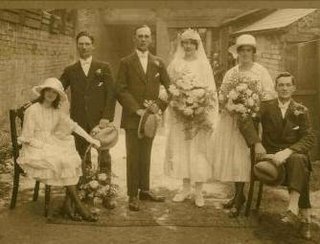 I once wrote a post on Religious vs. Civil Marriage that included a story of an elderly widower who was living with a widow without being married because they would lose their benefits if they married. The question of whether a secret marriage is permitted in such cases is addressed by Fr. Brian T. Mullady, O.P. in the November issue of Homiletic and Pastoral Review, a reputable priests' magazine now published by Ignatius Press and edited by Fr. Kenneth Baker, S.J.
I once wrote a post on Religious vs. Civil Marriage that included a story of an elderly widower who was living with a widow without being married because they would lose their benefits if they married. The question of whether a secret marriage is permitted in such cases is addressed by Fr. Brian T. Mullady, O.P. in the November issue of Homiletic and Pastoral Review, a reputable priests' magazine now published by Ignatius Press and edited by Fr. Kenneth Baker, S.J.In the column Questions Answered, a priest asks Fr. Mullady about a couple who asked if they could be married privately in the Church, but not bother about getting a marriage license from the State. The questioning priest said he told the couple that he could not marry them under those circumstances because marriage is a public event, not private.
Fr. Mullady concurs with the priest in his decision not to privately marry the couple so that they can avoid the establishment of civil effects. He describes several problems with a private (or almost secret) marriage. A summary of Fr. Mullady's comments follow.
Marriage is acknowledged by the Church to be an act with both religious and civil consequences, and a secret marriage can occur only in very rare instances when civil law is contrary to the natural law. A private marriage that is not registered with the State does not recognize the institution of marriage as the bulwark of the civil order and ignores the State's duty to protect and encourage stable marriages. Canon Law recognizes the normal jurisdiction of the State as contributing to the civil order and marriage. If the Church does not recognize the State's jurisdiction, the State can doubt whether the Church really wishes to give to Caesar the things which are his.
Furthermore, a private marriage undermines public perception of marriage and gives bad example when couples are seen to live together. Fr. Mullady concludes that "pastors [must] respect the requirements of the public registration of marriages by the civil law."
Remember that Fr. Mullady's answers were published in the same priests' magazine as the prior article by David R. Carlin that discussed whether religious marriages should be separated from civil marriages.









2 comments:
I'm seeing this more and more and it is such a scandal to us middle aged folks. Talk about putting money before morality!
On a seperate note, isn't it problematic that a "secretly married" couple would, in fact, be lying both implicitly and explicity to the state?
However sad it is that pensions and support from the state would be diminished, to accept these payments issued to them on the grounds they are not what they say they are (single) is implicit dishonesty.
If and when the time comes to fill out forms that require them to check the "single" or "married" box, to note themselves as "single" when in fact they had been secretly wed would be a lie.
Priests who were to aid in such a "secret wedding" would become involved in a deception.
Post a Comment